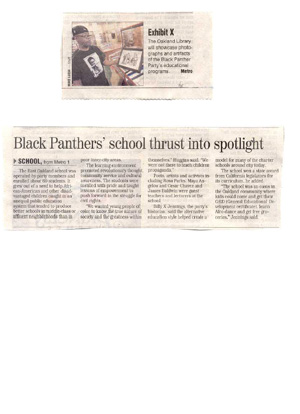Black Panthers' school in spotlight
By Kamika Dunlap, STAFF WRITER
Article Last Updated: 01/13/2008 02:46:17 AM PST
OAKLAND
ONE of the most revolutionary acts by the Black Panther Party was to educate young people of color.
If you want to see how they did it, an exhibit called "Educate to Liberate: The Schools of the Black Panther Party, 1973-1985" is on display starting Monday at the Oakland Library.
"A lot of people know whatever the conservative media and FBI said about the party ... or recognize the dramatic-looking berets, leather jackets and Negroes with guns," said Ericka Huggins, former co-director of the Oakland Community School. "But they don't know about the party's service to the community, and the school is a shining example of that."
The exhibit, which includes photographs and many other artifacts related to the party's educational programs, runs until April 15 at the Oakland History Room of the library at 125 14th St. The East Oakland school was operated by party members and enrolled about 60 students. It grew out of a need to help African-American and other disadvantaged children caught in an unequal public education system that tended to produce better schools in middle-class or affluent neighborhoods than in poor inner-city areas.
The learning environment promoted revolutionary thought, community service and cultural awareness. The students were instilled with pride and taught lessons of empowerment to push forward in the struggle for civil rights.
"We wanted young people of color to know the true nature of society and the greatness within themselves," Huggins said. "We were not there to teach children propaganda."
Poets, artists and activists including Rosa Parks, Maya Angelou and Cesar Chavez and James Baldwin were guest teachers and lecturers at the school.
Billy X Jennings, the party's historian, said the alternative education style helped create a model for many of the charter schools around city today.
The school won a state award from California legislators for its curriculum, he added.
"The school was an oasis in the Oakland community where kids could come and get their GED (General Educational Development certificate), learn Afro dance and get free groceries," Jennings said.



